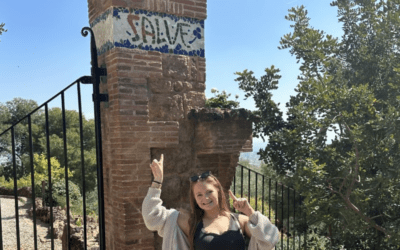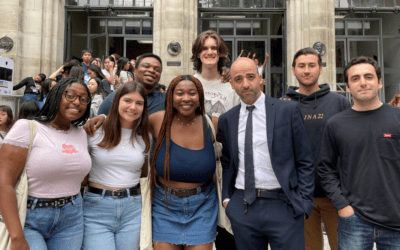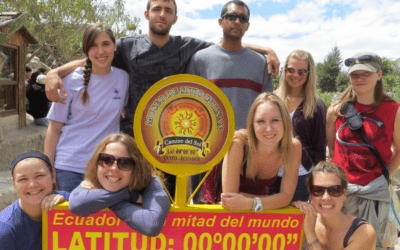Via allows administrator more time for students, less time ‘shuffling paper’When it came to application and post-acceptance processes, Joe Meringolo says he had “a bit of a learning curve” when he took on the role as Assistant Director, Study Abroad at Salve Regina...
Ethical Sales & Marketing for Study Abroad: Part III

Say Hello to Clarity and Goodbye to Data Overload
Say goodbye to data overload and hello to clarity with Via’s Enhanced Dashboards! Our cutting-edge solution transforms how you access, analyze, and act on key performance indicators.
Gone are the days of juggling multiple reports to piece together a comprehensive view. Our intuitive, all-in-one command center puts efficiency and actionable insights at your fingertips. With customizable views, advanced filtering, and lightning-fast performance, you’ll spend less time searching for data and more time making informed decisions.
From Old to New: The New Via Dashboard
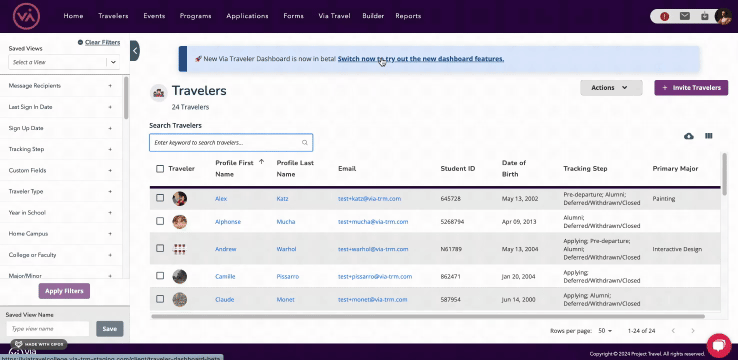
Key Features of the New Via Dashboard
Our Enhanced Dashboards come packed with powerful tools designed to help you work smarter and more efficiently.
Here’s a rundown of the key features:
 📈 Advanced Filtering
📈 Advanced Filtering
Slice and dice your data with precision using range-based, multi-select, and real-time filtering options. Uncover trends and patterns with ease.
 🔎 Powerful Search Functionality
🔎 Powerful Search Functionality
Quickly locate specific information using a powerful global search or column-specific search. Instantly surface relevant rows or data points within your tables by simply typing in keywords—enabling fast, efficient access to the insights you need.
 📑 Flexible Column Management
📑 Flexible Column Management
Tailor your dashboard to show only the data you need. Add, remove, or rearrange columns with ease, creating the perfect view for your needs.
 🌄 Saved Views & Filters
🌄 Saved Views & Filters
Found the perfect data configuration? Save it for instant access next time. Share your views with team members to streamline collaboration.
 🚀 Improved Performance
🚀 Improved Performance
Lightning-fast page loads and enhanced data visibility mean less waiting, more insights.
 🎬 Efficient Batch Actions
🎬 Efficient Batch Actions
Save time by performing actions on multiple rows at once. Select individual rows or use the ‘select all’ feature to apply changes, send messages, or update statuses in bulk.
 📤 Excel + CSV Exporting
📤 Excel + CSV Exporting
Need to dig deeper or share data externally? Download a CSV of your current table view with a single action.
With these features at your fingertips, the New Via Dashboard isn’t just a tool – it’s your personal command center for data-driven decision making in study abroad management.
The New Traveler Activity Dashboard
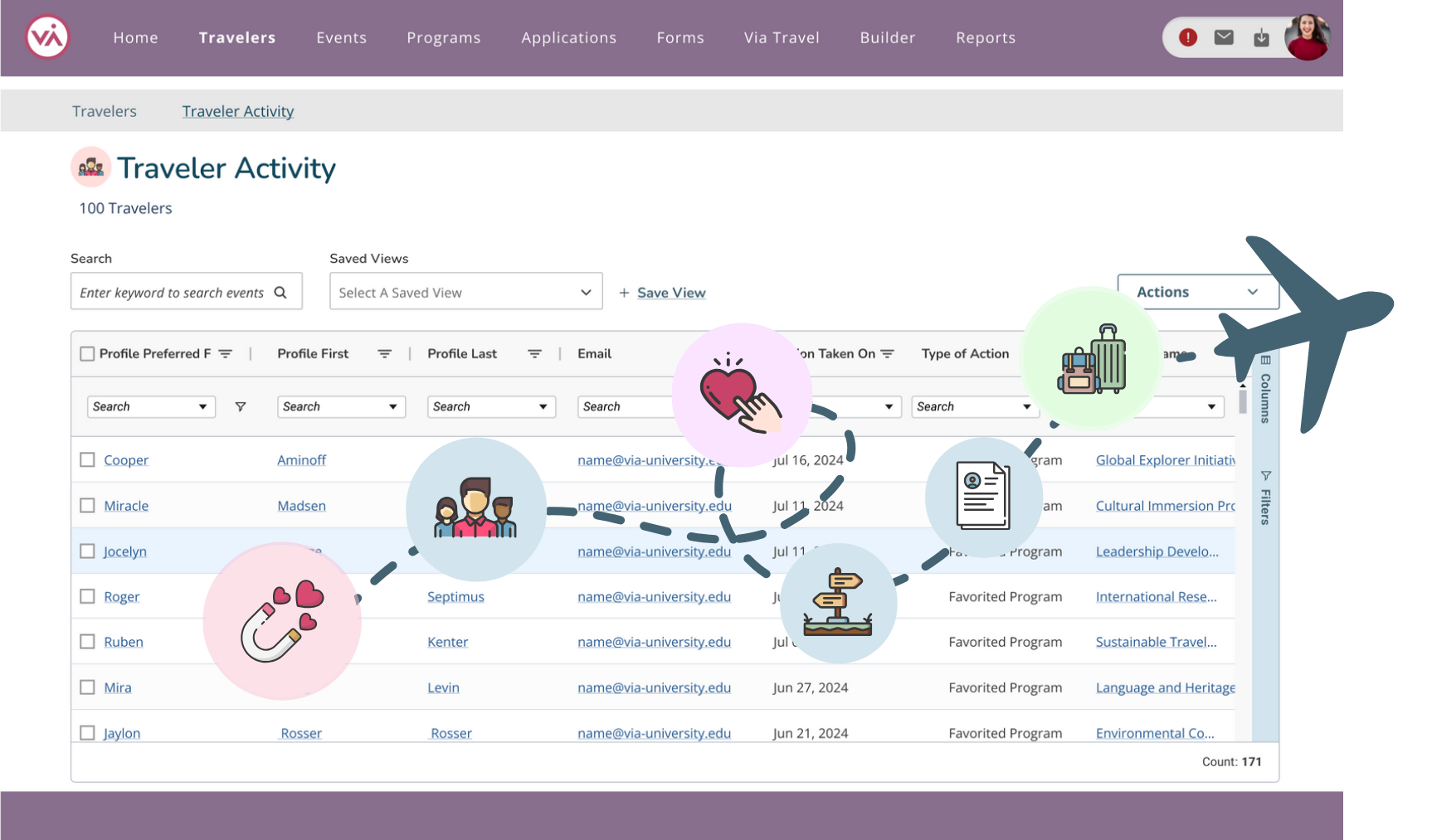
Unlock Early-Stage Student Engagement
The Traveler Activity Dashboard offers powerful insights into early-stage engagement, tracking how students interact with your program brochures and catalogs. This visibility helps you better understand their interests and actions, allowing you to tailor programs and messaging for maximum impact.
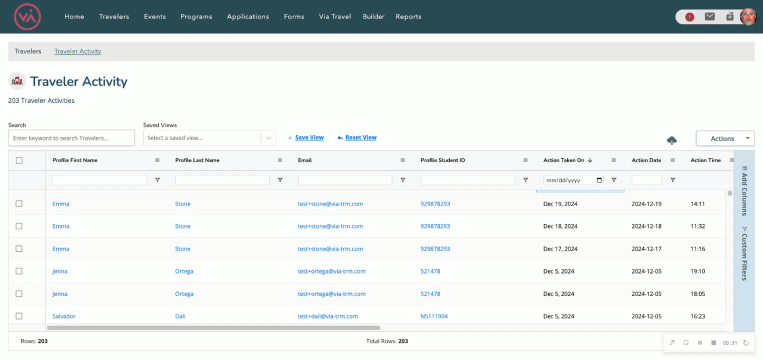
Let’s say you want to email students interested in Spanish programs about an upcoming study abroad event. Using the new dashboard, you can:
Filter the Traveler Activity Dashboard for “favorited” programs in Spanish-speaking countries.
Select all filtered students.
Use the batch action feature to send a personalized email inviting them to an informational session about studying abroad in Spanish-speaking countries.
This streamlined process allows you to quickly target and engage with the most relevant audience for your event.
Ready to Start
Your Via Journey?
Via Helps Oglethorpe Bring Study Abroad to More Diverse Student Population
“Via ensures more students can see themselves in our programs,” director says.When she became the inaugural assistant dean and director of global education at Oglethorpe University in August 2018, Marisa Atencio, EdD, inherited six file drawers of papers and...
Via Helps Harper Grow Study Abroad
Via gives students the power to navigate options, says program assistant. In February 2022, Angelica Rackow was promoted to program assistant in the Office of International Education at Harper College, where she’s worked since 2016. With her new job came a new...

